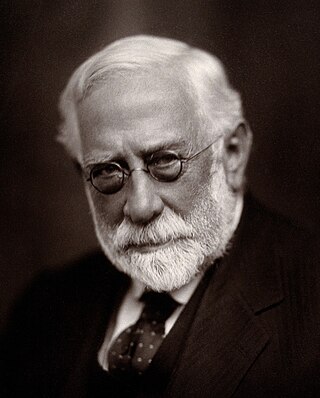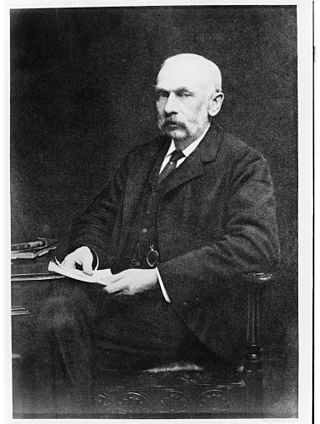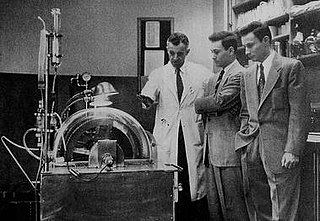Related Research Articles

Hyperparathyroidism is an increase in parathyroid hormone (PTH) levels in the blood. This occurs from a disorder either within the parathyroid glands or as response to external stimuli. Symptoms of hyperparathyroidism are caused by inappropriately normal or elevated blood calcium excreted from the bones and flowing into the blood stream in response to increased production of parathyroid hormone. In healthy people, when blood calcium levels are high, parathyroid hormone levels should be low. With long-standing hyperparathyroidism, the most common symptom is kidney stones. Other symptoms may include bone pain, weakness, depression, confusion, and increased urination. Both primary and secondary may result in osteoporosis.

Sir Thomas Barlow, 1st Baronet, was a British royal physician, known for his research on infantile scurvy.
The Medical Household is the medical part of the Royal Household of the Sovereign of the United Kingdom.
Physician to the King is a title held by physicians of the Medical Household of the Sovereign of the United Kingdom. Part of the Royal Household, the Medical Household includes physicians, who treat general conditions, and extra physicians, specialists who are brought in as required.
Hugh Redmond Brady is an Irish academic, the 17th President of Imperial College London, and a professor of medicine. He was the 13th President and Vice-Chancellor of the University of Bristol. He is also President Emeritus of University College, Dublin (UCD), having served as UCD's eighth President from 2004 to 2013.

Sir Edward Farquhar Buzzard, 1st Baronet, was a prominent British physician and Regius Professor of Medicine at the University of Oxford (1928–1943).

Sir Rickman John Godlee, 1st Baronet was an English surgeon. In 1884 he became one of the first doctors to surgically remove a brain tumor, founding modern brain surgery.

Sir William Henry Broadbent, 1st Baronet was an English neurologist who was a leading British authority in the field of cardiology and neurology. He also performed research involving diseases such as tuberculosis and cancer. In 1881 he was elected President of the London Medical Society and in 1887 President of the Clinical Society of London. Broadbent was a Physician-Extraordinary to Queen Victoria and Physician-in-Ordinary to King Edward VII and the Prince of Wales.

Paricalcitol (chemically it is 19-nor-1,25-(OH)2-vitamin D2. Marketed by Abbott Laboratories under the trade name Zemplar) is a drug used for the prevention and treatment of secondary hyperparathyroidism (excessive secretion of parathyroid hormone) associated with chronic kidney failure. It is an analog of 1,25-dihydroxyergocalciferol, the active form of vitamin D2 (ergocalciferol).

John Putnam Merrill was an American physician and medical researcher. He led the team which performed the world's first successful kidney transplant. He generally credited as the "father of nephrology" or "the founder of nephrology," which is the scientific study of the kidney and its diseases.

Sir Frederick Treves, 1st Baronet, was a prominent British surgeon, and an expert in anatomy. Treves was renowned for his surgical treatment of appendicitis, and is credited with saving the life of King Edward VII in 1902. He is also widely known for his friendship with Joseph Merrick, dubbed the "Elephant Man" for his severe deformities.
Csaba P. Kovesdy is an American nephrologist and a professor of medicine–nephrology at the University of Tennessee Health Science Center as well as Chief of Nephrology at the Memphis Veterans Affairs Medical Center. He is also affiliated with Methodist Hospitals of Memphis and Le Bonheur Children's Hospital, also in Memphis.

Sir Richard Paul Hepworth Thompson, is a British physician and past president of the Royal College of Physicians in London.
Sir Marcus Edward Setchell, is a leading British obstetrician and gynaecologist and the former Surgeon-Gynaecologist to Queen Elizabeth II's Royal Household.

Sir Anthony Alfred Bowlby, 1st Baronet was a British Army officer, surgeon and pathologist.
Sir Huw Jeremy Wyndham Thomas is a British gastroenterologist at St Mary’s Hospital, London, and professor of Gastrointestinal Genetics at Imperial College London and St Mark's Hospital.
Sir John Charles Batten KCVO, FRCP was a British physician, who served as physician to Queen Elizabeth II from 1974 to 1989.

Mary Graham "Mollie" McGeown was a Northern Irish nephrologist and biochemist. She was a pioneer in dialysis and kidney transplantation, overseeing the first dialysis centre in Northern Ireland and designing the "Belfast recipe" for post-transplantation care.
Sir William Gilliatt was an English gynaecologist at the Middlesex Hospital and King's College Hospital, London.
Sir Roger Henry Vickers KCVO is a British orthopaedic surgeon, who had been part of the Medical Household as an Orthopaedic Surgeon to the Queen and was later appointed Serjeant Surgeon.
References
- 1 2 "Honours and Awards". The Gazette. 5 August 2014. Retrieved 9 September 2014.
- 1 2 ‘CUNNINGHAM, Prof. John’, Who's Who 2017, A & C Black, an imprint of Bloomsbury Publishing plc, 2017
- 1 2 3 4 "Professor John Cunningham – At the Limits". www.atthelimits.org. Retrieved 29 January 2022.
- ↑ Professor John Cunningham Archived October 4, 2013, at the Wayback Machine
- ↑ Malvern, Jack. "Duke of Edinburgh in hospital as chest infection makes him miss charity event". The Times. Archived from the original on 21 May 2021. Retrieved 21 May 2021.
- ↑ Wright, Paul (2 August 2014). "Former lead physician to the Queen and Royal Free professor knighted". Hampstead Highgate Express. Retrieved 29 January 2022.
- ↑ Achieving therapeutic targets in the treatment of secondary hyperparathyroidism
- ↑ New Vitamin D analogs and changing therapeutic paradigms